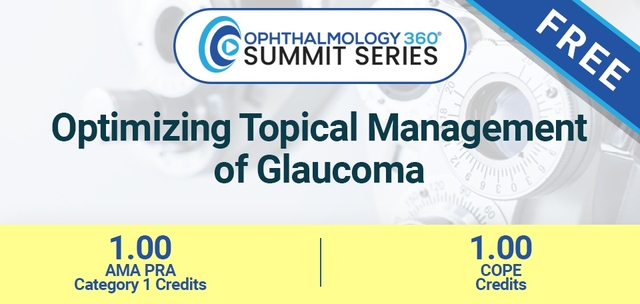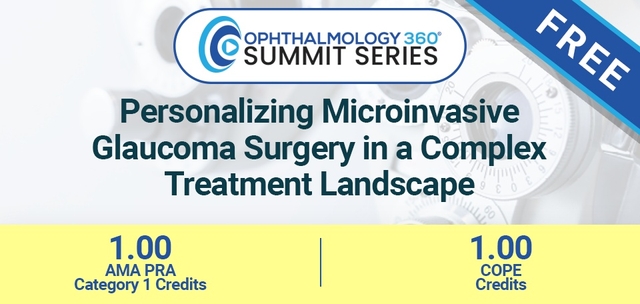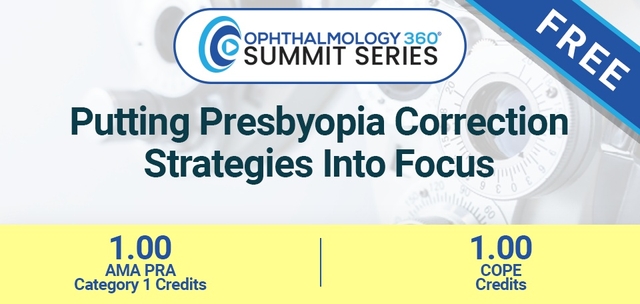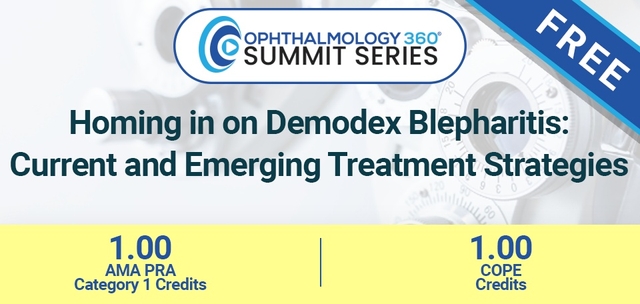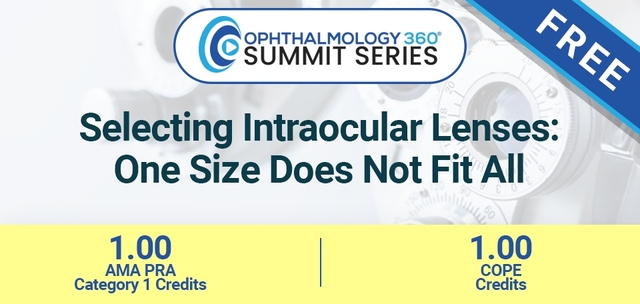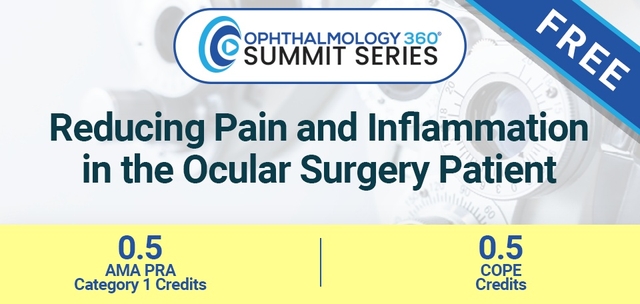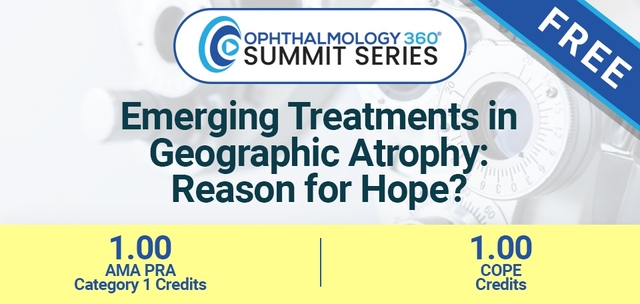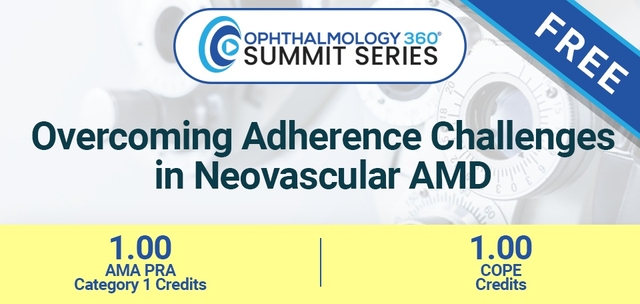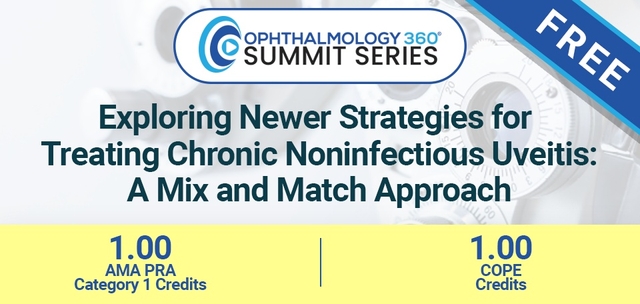CME/CE
Optimizing Topical Management of Glaucoma
This session, which was included as part of the 2023 Ophthalmology 360 Summit Series, will review traditional and novel agents in the management of ocular hypertension (OH) and open-angle glaucoma (OAG), including monotherapy and combination regimens. Attention will be given to mechanisms of action, factors that need to be considered in treatment decision-making, and strategies for improving treatment adherence.Personalizing Microinvasive Glaucoma Surgery in a Complex Treatment Landscape
This session, which was included as part of the 2023 Ophthalmology 360 Summit Series, will provide an overview of currently available microinvasive glaucoma surgery (MIGS) procedures, including their safety and efficacy and strategies for identifying appropriate candidates and personalizing treatment selection. It will also review strategies for improving the co-management of patients who are candidates for MIGS or have undergone these procedures.Putting Presbyopia Correction Strategies Into Focus
This session, which was included as part of the 2023 Ophthalmology 360 Summit Series, will review nonsurgical and surgical strategies for correcting presbyopia, from glasses and contact lenses to eye drops and procedures, including use of intraocular lenses and emerging techniques such as laser scleral microporation. Discussion will focus on how patients can be better matched with treatments.Uncovering Dry Eye Disease in Clinical Practice: How Would You Diagnose and Treat?
This session, which was included as part of the 2023 Ophthalmology 360 Summit Series, will provide an overview of dry eye disease (DED), including its quality-of-life impact, risk factors, and strategies for making a timely diagnosis, including how to distinguish between aqueous-deficient, hyperevaporative, and mixed-type DED. It will also review current treatment approaches, from topical agents to devices and procedures. The activity will include 2 patient case scenarios to demonstrate the real-world application of diagnostic and treatment approaches.Homing in on Demodex Blepharitis: Current and Emerging Treatment Strategies
This session, which was included as part of the 2023 Ophthalmology 360 Summit Series, will review the incidence/prevalence of Demodex blepharitis and strategies for making a timely diagnosis. It will also review current and emerging treatments and their safety and efficacy in treating this condition.Selecting Intraocular Lenses: One Size Does Not Fit All
This session, which was included as part of the 2023 Ophthalmology 360 Summit Series, will review the various types of intraocular lenses (IOLs), including those currently available and emerging next-generation options, considerations for optimally matching patients with lenses, and strategies for educating patients about their options and involving them in treatment decision-making.Reducing Pain and Inflammation in the Ocular Surgery Patient
This session, which was included as part of the 2023 Ophthalmology 360 Summit Series, will review risk factors for pain and inflammation after ocular surgery, with a focus on cataract surgery. Discussion will examine strategies for reducing risk of postoperative pain and inflammation and improving patient adherence with postoperative regimens, including use of novel drug delivery systems and sustained-release therapies, and addressing postoperative dry eye.Optimizing Intravitreal Pharmacotherapies for Diabetic Macular Edema
This session, which was included as part of the 2023 Ophthalmology 360 Summit Series, will provide an overview of the mechanism of action, safety, and efficacy of current and emerging treatments for diabetic macular edema (DME), including anti-vascular endothelial growth factor agents and corticosteroids. Discussion will also focus on disparities in caring for patients with DME, the burden of DME and its treatments on quality of life, and strategies for improving treatment adherence, with a look at some emerging approaches that have the potential to reduce treatment burden.Emerging Treatments in Geographic Atrophy: Reason for Hope?
This session, which was included as part of the 2023 Ophthalmology 360 Summit Series, will review the quality-of-life impact of geographic atrophy (GA) and examine current and emerging treatment approaches, including complement inhibitors and other pathways, such as neuroprotective agents and gene therapy. Discussion will include the rationale for various treatment approaches in GA and examine the safety and efficacy data from key clinical trials.Overcoming Adherence Challenges in Neovascular AMD: Exploring Variable Dosing Strategies and New Treatment Pathways and Delivery Systems
This session, which was included as part of the 2023 Ophthalmology 360 Summit Series, will review challenges with standard-of-care treatments for neovascular age-related macular degeneration (nAMD), particularly the need for frequent injections, and the use of variable dosing strategies to address these challenges. The session will also review the safety and efficacy of newer strategies to improve treatment duration and patient adherence, including longer-acting drugs, longer-acting technologies, and gene therapies.Exploring Newer Strategies for Treating Chronic Noninfectious Uveitis: A Mix and Match Approach
This session, which was included as part of the 2023 Ophthalmology 360 Summit Series, will examine the evidence for biologic immunomodulatory agents and intravitreal treatments in patients with chronic noninfectious uveitis. It will review their mechanism of action and key questions regarding their use, such as when to initiate these treatments, considerations when selecting between or combining treatments, how to monitor patients, and when to stop treatment.AI Analysis of SD-OCT Shows Complement C3 Inhibition Preserves Photoreceptors in Geographic Atrophy
There are currently no FDA-approved treatments for geographic atrophy (GA), but it is a condition for which there are many potentially practice-changing developments on the horizon. A New Drug Application for intravitreal pegcetacoplan, a complement C3 inhibitor, has been submitted to the FDA, and a Prescription Drug User Fee Act target action date is set for February 2023. Recently, advanced imaging applying artificial intelligence (AI) to spectral domain-optical coherence tomography provided additional evidence supporting the use of intravitreal pegcetacoplan as a treatment for GA and demonstrated that AI can be an invaluable tool for monitoring GA disease activity and treatment response. This activity will review these new developments for clinicians treating patients with GA.Experts Publish First Guidance on Use of Teprotumumab for Thyroid Eye Disease
Teprotumumab, a disease-modifying therapy, is currently the only drug approved by the FDA specifically for thyroid eye disease (TED). Despite being available since 2020, there are no guidelines to optimize its use in clinical practice. To address this gap, an expert panel came to a consensus on teprotumumab treatment recommendations, including when to initiate treatment, pretreatment considerations, monitoring throughout treatment, and strategies for mitigating and managing treatment-related adverse effects.Informatics Study Reveals Real-World Outcomes for Glaucoma Filtration Surgery: Implications for Clinical Practice
Health informatics is an evolving field with the potential to improve understanding of real-world medical practice and patient outcomes, which may be particularly helpful in areas where data have been limited or there are specific data gaps, such as in the rapidly evolving setting of glaucoma filtration surgery.Contact Info
© 2024 Ophthalmology 360® is a trademark of International Healthcare Media, LLC. All rights Reserved
